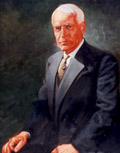Ellsworth Statler
Founder of Statler Hotels
 Ellsworth Statler was born in poverty, but his innate business sense enabled him to acquire great success in the hotel industry. From the time he became a bellboy at age 13, he had a consuming curiosity about every aspect of the hotel business, and his enthusiasm led to greater responsibilities. From the beginning, he had innovative ideas that improved profitability. For example, he convinced the hotel owner where he worked to add a railroad ticket counter, the first to ever operate in an American hotel. Ellsworth Statler was born in poverty, but his innate business sense enabled him to acquire great success in the hotel industry. From the time he became a bellboy at age 13, he had a consuming curiosity about every aspect of the hotel business, and his enthusiasm led to greater responsibilities. From the beginning, he had innovative ideas that improved profitability. For example, he convinced the hotel owner where he worked to add a railroad ticket counter, the first to ever operate in an American hotel. His first hotel was a temporary structure he built for the 1901 Pan American Exposition held in Buffalo, New York. The exposition itself was a commercial failure, but Statler earned a small profit on his venture. He used the money to build another temporary hotel for the successful 1904 St. Louis Exhibition. That profit enabled Statler to construct his first permanent hotel in Buffalo in 1908. Innovation and attention to guest conveniences insured Statler’s success, revolutionized the hotel industry in 1908 and continued to provide standards for hospitality leadership. In the Buffalo Statler, each guest room featured a private bathroom, closet, running water, telephones and electric light switches by the door. Other guest-room innovations included a lamp over each bed and a writing desk with hotel stationery. The vertical corridor for pipes and other utilities is now commonplace in most high-rise construction, but at the time it enabled Statler to offer the rooms at competitive rates. By 1927, Statler had hotels in Cleveland, Detroit, St. Louis and New York City, where he built the largest hotel of its day, the 2,002-room Pennsylvania Hotel. Ellsworth Statler had a unique philosophy—“Life is service. The one who progresses is the one who gives his fellow human beings a little more, a little better service.” Statler was the first hotelier to give employees a six-day work week, paid vacations and free health service. He also devised a profit-sharing plan. Statler died unexpectedly in 1928, but his widow, Alice Statler, continued the expansion of his company and avoided financial difficulties during the Depression. Statler’s will created the Statler Foundation as an instrument for the perpetuation of his ideals. Those ideals not only fueled the success of Statler Hotels, but also continue to fund research for the benefit of the hotel industry in the United States and to support the education of future generations of individuals who enter the hospitality profession. |